ข่าวและกิจกรรม
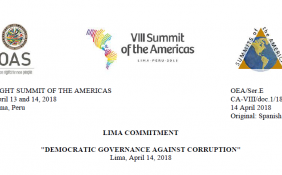
VIII SUMMIT OF THE AMERICAS - LIMA COMMITMENT
Lima Commitment "Democratic Governance Against Corruption", adopted by the Heads of State and Government of the Hemisphere during the VIII Summit of the Americas, held in Lima on 13th and 14th April 2018.
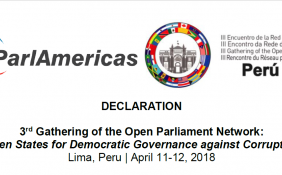
THE 3RD GATHERING OF THE PARLAMERICAS OPEN PARLIAMENT NETWORK
DECLARATION
3rd Gathering of the Open Parliament Network:
Open States for Democratic Governance against Corruption
Lima, Peru | April 11-12, 2018
We, parliamentarians representing 25 countries in the Americas and the Caribbean, gathered in Lima, Peru on April 11-12, 2018, for the 3rd Gathering of the ParlAmericas Open Parliament Network, held on the occasion of the VIII Summit of the Americas.
During this gathering, we discussed democratic governance against corruption and the important role that legislatures play in confronting this issue. The working sessions and dialogues allowed for the exchange of valuable experiences and knowledge related to initiatives currently being adopted by our parliaments that are inspired by the open parliament pillars and seek to fight corruption in all branches of public office. We also discussed the importance of encouraging initiatives that promote ethics and probity in the exercise of parliamentary functions; the development of mechanisms aimed at empowering women as central actors in governance strengthening and the fight against corruption; and the definition of guidelines for drafting open parliament action plans, which are being co-created with civil society.
In view of the above and,
Recognizing:
That corruption is one of the greatest challenges of our time, given that it negatively impacts the economic and social development of our countries; deepens social inequalities and limits access to services and public goods; erodes citizen confidence in the political system and delegitimizes democratic institutions; and, moreover, can hinder the achievement of the goals of the 2030 Agenda for Sustainable Development;
That women, indigenous peoples and traditionally marginalized groups are affected by corruption in greater proportion and/or in different ways, and that their ability to denounce corrupt practices can be limited by power dynamics and other social factors;
That international agreements like the United Nations Convention against Corruption, the Inter-American Convention against Corruption, and the Mechanism for Follow-Up on the Implementation of the Inter-American Convention against Corruption (MESICIC) recognize the international scope of corruption and are intended to promote and facilitate cooperation between States in the fight this phenomenon;
That the legislative branch plays a vital role in the fight against corruption through the exercise of its powers of representation, legislation, and political oversight of actions by the public administration; as well as in the adoption and development of regulatory frameworks related to treaties and international conventions that address this fight;
That, in open States, the executive, legislative, and judicial branches jointly undertake cross-cutting efforts to strengthen governance in support of anti-corruption measures, through more transparent institutions that are accountable and involve citizens, collaboration with civil society, and alignment with the principles promoted by the Open Government Partnership;
That parliaments have the responsibility to lead by example in anti-corruption initiatives, promoting actions in support of legislative openness, facilitating interaction between citizens and the legislature, and guaranteeing access to public information, accountability, and high standards for ethics and probity in parliamentary work, as well as the participation of women from diverse socioeconomic backgrounds, in order to ensure their points of view are considered within legislative initiatives seeking to counteract corruption and the social inequalities that it can exacerbate;
That open parliament action plans co-created by parliaments and civil society are a useful mechanism for advancing initiatives that promote the principles of legislative openness and contribute to empowering citizens to hold their leaders and representatives accountable, and, through this, confront corruption;
That advances in information and communications technology have transformed the way in which citizens interact with and relate to public institutions, and that the use of these technologies is indispensable for modernizing and improving the efficacy and transparency of parliamentary processes to exchange information with citizens and facilitate their participation in parliamentary work;
That diplomacy and cooperation between parliaments and between legislators on matters related to the prevention, investigation, and prosecution of acts of corruption can consolidate the political support necessary to extend this cooperation to the level of national governments; and that the exchange of best legislative practices can contribute to the adoption of more effective national laws;
We commit to:
1. Adopting legislation, regulatory frameworks, and practices that can be effectively applied and that promote transparency, accountability, citizen participation, and the highest ethical standards in the governance of our institutions.
2. Promoting multi-party collaboration to adopt legislative initiatives that contribute to the prevention of and fight against corruption, including, but not limited to, the protection of whistleblowers, witnesses, and individuals involved in investigating acts and cases of corruption; and the financing and expenses of political organizations and parties.
3. Promoting a gender and intercultural perspective in all legislative reforms or measures against corruption, taking into account that this disproportionately affects women, and that it is therefore necessary to consider the impacts and effects that all legislative initiatives that address this problem could have on this population group; and through this contributing to the achievement of the goals of the 2030 Agenda for Sustainable Development.
4. Facilitating cooperation between States in the fight against corruption through the implementation of existing international conventions and mechanisms, such as the United Nations Convention against Corruption, the Inter-American Convention against Corruption, and the Mechanism for Follow-Up on the Implementation of the Inter-American Convention against Corruption (MESICIC).
5. Strengthening inter-institutional relations in order to establish comprehensive legislative responses that curb corruption, promoting the principles and values of the Open Government Partnership, and taking action directed at advancing the open government agenda from the parliament.
6. Encouraging public integrity through strengthened parliamentary codes of conduct, the regulation of conflicts of interest, and the development of mechanisms aimed at preventing inequalities, discrimination based on gender or ethnicity, and harassment in parliament.
7. Encouraging the creation and implementation of national open government action plans, including open parliament action plans and other mechanisms developed in collaboration with civil society; and exercising our oversight role over the fulfillment of the commitments made in these plans.
8. Fostering transparency, responsibility, and openness to citizens in our parliaments, utilizing information and communications technologies to facilitate and strengthen interaction with the public, and the exercise of its oversight functions.
9. Pursuing the adoption of priority measures agreed upon by our States in the final declaration of the VIII Summit of the Americas, assisting in the fulfillment of these commitments by our respective governments.
10. Strengthening inter-parliamentary cooperation, encouraging inter-governmental cooperation and the exchange of legislative best practices related to the fight against corruption in our hemisphere.
Adopted in Lima, Peru, April 12, 2018
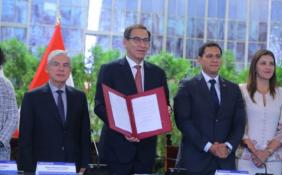
การประกาศใช้กฎหมายว่าด้วยการเปลี่ยนแปลงสภาพภูมิอากาศ
วันที่ 17 เมษายน พ.ศ. 2561 ประธานาธิบดีแห่งสาธารณรัฐเปรู นายมาร์ติน บิซการ์ราได้ประกาศใช้กฎหมายว่าด้วยการเปลี่ยนแปลงสภาพภูมิอากาศเป็นครั้งแรกในอเมริกาใต้ หลังจากมีผลบังคับใช้ในข้อตกลงปารีสในปี
พ. ศ. 2560 กฎหมายฉบับนี้ได้รับการอนุมัติโดย รัฐสภาแห่งสาธารณรัฐเปรูเมื่อวันที่
15 มีนาคม ที่ผ่านมา
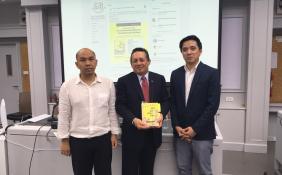
"ยัญพิธีเชือดแพะ" หนังสือของนักเขียนชื่อดังชาวเปรู ได้รับการแปลเป็นภาษาไทย
เอกอัครราชทูตเปรูประจำประเทศไทย เข้าร่วมในงานเสวนาเพื่อนำเสนอนวนิยายแปลภาษาไทยเรื่องแรก
"ยัญพิธีเชือดแพะ" ของนักเขียนรางวัลโนเบล สาขาวรรณกรรม ชาวเปรู มาริโอ
บาร์กัส โญซา จัดพิมพ์โดยสำนักพิมพ์บทจร ณ มหาวิทยาลัยธรรมศาสตร์ ท่าพระจันทร์
ก่อนเริ่มงานเสวนา เอกอัครราชทูตเปรูประจำประเทศไทย กล่าวแสดงความยินดีและขอบคุณ กับความคิดริเริ่มแปลนวนิยายของนักเขียนชาวเปรูเป็นภาษาไทยของสำนักพิมพ์บทจร นอกจากนี้ท่านได้เสริมอีกว่า การแปลหนังสือนั้นเป็นวิธีที่ดีที่สุดในการเผยแพร่วัฒนธรรม ความคิด ค่านิยม เพื่อเข้าถึงและทำรู้จักประเทศดังกล่าวได้เป็นอย่างดี
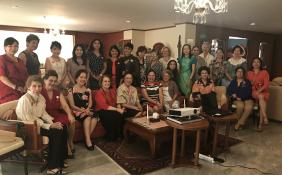
โปรโมทการท่องเที่ยวเปรูในประเทศไทย
เมื่อวันที่ 27 มีนาคม ที่ผ่านมา สถานเอกอัคคราชฑูตเปรูประจำประเทศไทยได้เป็นเจ้าภาพในการจัดงาน Get to Know You: Peru ให้กับสมาชิคชมรม Women International Club โดยมีภริยาท่านทูตเปรูประจำประเทศไทยเป็นประธานในการจัดงานครั้งนี้ และมีจุดประสงค์เพื่อให้นำเสนอสถานที่ท่องเที่ยวต่าง ๆ ของเปรู ภายในงาน มีช่วงให้ผู้ผู้เข้าร่วมได้ถาม-ตอบ พูดคุยเกี่ยวกับสถานที่ท่องเที่ยว อาหารและประวัติศาสตร์ของประเทศเปรู

-
อีเมลinfo@peruthai.or.th
-
โทรศัพท์+662 260 6243/45/48
-
ที่อยู่
สถานเอกอัครราชทูตเปรูประจำประเทศไทย
ชั้น 16 อาคารกลาสเฮาส์
สุขุมวิท 25, วัฒนา ,
กทม.,10110
ประเทศไทย






